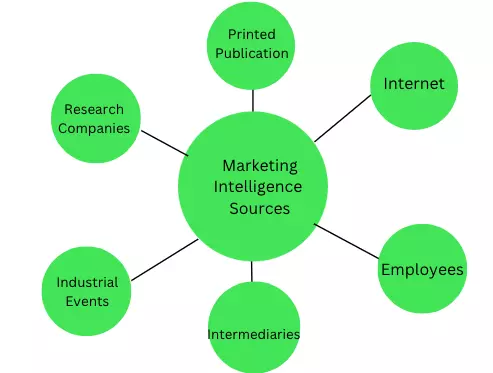Marketing Intelligence
Definition
Marketing intelligence is the process of gathering and analysing data related to a company’s market, customers, and competitors to inform strategic decision-making.
Description
Marketing intelligence collects, analyses, and interprets data related to a company’s market, customers, and competitors to inform strategic decision-making. It involves gathering primary and secondary data from various sources, including market research, customer feedback, and competitor analysis.

The primary purpose of marketing intelligence is to help companies better understand their target market and their competitors and identify new opportunities for growth and innovation. By gathering and analysing customer behaviour, preferences, and trends, companies can develop more targeted marketing strategies and improve their overall customer experience.
Marketing intelligence can also help companies identify potential threats to their business, such as new competitors or changes in consumer behaviour, and develop proactive strategies to mitigate those risks. It can also inform product development and innovation by providing insights into customer needs and preferences.
Some standard techniques used in marketing intelligence include surveys, focus groups, customer feedback, social media listening, website analytics, and competitor analysis. Data is often collected and analysed using specialised software and tools, such as data visualisation software, customer relationship management (CRM) systems, and business intelligence (BI) platforms.
Importance of Marketing Intelligence
Marketing intelligence is crucial for businesses because it enables them to make informed decisions based on data and insights rather than guesswork or assumptions. Here are some of the key reasons why marketing intelligence is essential:
- A better understanding of customers: By gathering and analysing customer behaviour, preferences, and trends, companies can develop a deeper understanding of their target market and create more targeted and effective marketing strategies.
- Improved competitive positioning: Marketing intelligence helps companies monitor their competitors and stay up-to-date on industry trends, enabling them to identify opportunities for differentiation and maintain a competitive edge.
- Enhanced product development: By gathering customer feedback and analysing market trends, companies can develop products that better meet customer needs and preferences.
- Increased ROI: Marketing intelligence enables companies to optimise their marketing strategies, targeting the right audience with the right message at the right time, which can lead to increased sales and ROI.
- Proactive risk management: Marketing intelligence helps companies identify potential threats to their business, such as new competitors or changes in consumer behaviour, and develop proactive strategies to mitigate those risks.
How to optimise Marketing Intelligence?
Optimising marketing intelligence involves several key steps:
- Define clear objectives: Start by defining goals for your marketing intelligence efforts. What do you hope to achieve? What questions do you need to answer? This will help you stay focused and ensure you collect and analyse the correct data.
- Collect the correct data: Identify the data sources to collect the information required to achieve your objectives. This may include primary research, such as surveys and focus groups, and secondary research, such as industry reports and social media monitoring.
- Analyze and interpret the data: Once you have collected the data, you need to analyze and analyze it to gain insights. This may involve data visualization tools, statistical analysis, or other techniques to uncover patterns and trends.
- Share insights: Share the insights you have gained with relevant stakeholders, such as marketing teams, product development teams, or senior executives. This will help ensure the senses inform decision-making and drive results.
- Take action: Use the insights gained through marketing intelligence to make data-driven decisions and optimize your marketing efforts. This may involve adjusting your marketing strategy, targeting specific customer segments, or developing new products.
- Continuously monitor and refine: Marketing intelligence is an ongoing process, so it’s essential to constantly monitor and refine your efforts based on new data and insights. Regularly review your objectives and data sources to ensure you collect the correct information to drive results.
Future Aspect of Marketing Intelligence
The future of marketing intelligence is expected to be shaped by several key trends:
- Artificial intelligence (AI): AI is already being used to automate tasks such as data collection and analysis, and it is expected to become more prevalent in marketing intelligence. AI can help marketers make sense of large volumes of data and identify patterns and insights that would be difficult to uncover manually.
- Predictive analytics: Predictive analytics uses data, statistical algorithms, and machine learning techniques to identify the likelihood of future outcomes based on historical data. As marketers seek to become more data-driven and proactive, predictive analytics is expected to become more critical in marketing intelligence.
- Real-time data analysis: The ability to analyse data in real time is becoming increasingly important as marketers seek to respond quickly to changing market conditions and customer needs. Real-time data analysis allows marketers to make informed decisions in real-time rather than relying on historical data.
- Omnichannel marketing intelligence: As consumers increasingly use multiple channels to interact with brands, marketing intelligence must incorporate data from various channels, including social media, mobile apps, email, and more.
- Privacy and data security: As data privacy and security concerns continue to grow, marketers must ensure that their marketing intelligence efforts comply with relevant regulations and best practices.
Example:
One example of marketing intelligence in India is using digital analytics to gather insights into consumer behaviour and preferences. Companies in India can collect data on website traffic, social media engagement, and search engine queries to understand how their target audience interacts with their brand online.
This information can then be used to create targeted marketing campaigns, improve customer experience, and develop new products or services that better meet consumer needs. Additionally, companies in India can use market research and competitive analysis to stay up-to-date on industry trends and better understand their competitors.
By leveraging marketing intelligence, companies in India can make informed business decisions and remain competitive in their respective markets.
FAQs
What is marketing intelligence?
Marketing intelligence is collecting and analysing data to gain insights into consumer behaviour, market trends, and competitor activity. It helps businesses make informed decisions about marketing strategy, product development, and overall business operations.
What kind of data is used in marketing intelligence?
Marketing intelligence uses a variety of data sources, including consumer surveys, website analytics, social media data, sales figures, and industry reports. The goal is to collect as much data as possible to comprehensively understand the market and consumer behaviour.
How is marketing intelligence different from market research?
Market research gathers information about consumer needs, preferences, and behaviour. Marketing intelligence, on the other hand, goes beyond market research by analysing a more comprehensive range of data sources and providing insights into broader market trends and competitor activity.
How is marketing intelligence used in business?
Marketing intelligence informs marketing strategy, product development, and overall business operations. By analysing consumer behaviour, market trends, and competitor activity, businesses can make informed decisions about positioning their products, which marketing channels to use, and how to stay ahead of their competitors.
What are some examples of marketing intelligence tools?
Many marketing intelligence tools are available, including website analytics software, social media listening tools, and market research platforms. Some famous examples include Google Analytics, Hootsuite, and Mintel. Businesses can also work with marketing intelligence agencies to gather and analyse data on their behalf.
How can marketing intelligence help businesses stay competitive?
Businesses can make informed decisions about marketing strategy and product development by gathering insights into consumer behaviour, market trends, and competitor activity. This allows them to stay ahead of their competitors and better meet the needs of their target audience. Marketing intelligence also helps businesses identify opportunities for growth and expansion.





We would love to have your opinion.